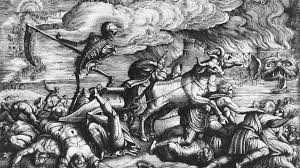The Renaissance humanism is an intellectual and philosophical movement that developed during the Renaissance period (XV and XVI).
Anthropocentrism (man at the center of the world) was the main concept on which the philosophical thinking of the time was based.
In literature, humanism represents a transition phase between troubadour and classicism, or even the second medieval era.
Rebirth
It is worth remembering that the Renaissance was an artistic and philosophical movement that started in the 15th century in Italy and that gradually spread throughout the European continent.
With the fall of the feudal system, which had been boosted by the formation of a new social class (the bourgeoisie) as well as the intensification of trade, the renaissance appeared to fill several gaps.
In this sense, the expansion of scientism (Copernicus, Galileo, Kepler, Newton, etc.) came to confront several dogmas of the Catholic Church, which gradually lost its faithful, especially with the Protestant reform.
Alongside this, Renaissance anthropocentrism replaces medieval theocentrism. It is an important period of social, cultural, political and economic changes, which influenced the mentality of the time.
Protestant Reformation
The Protestant reform , which began in the 16th century, represented a religious reform movement that altered the ecclesiastical structure of the Catholic Church.
Martin Luther was the forerunner of the movement with the 95 theses he wrote rejecting some practices proclaimed by the Church, for example, the sale of indulgences.
This movement spread to different parts of Europe. In response, the Catholic movement of Counter-reform appears.
Summary: Humanist Philosophy
Humanism was an intellectual movement that manifested itself in the arts and philosophy. Humanist philosophers aimed to bring up issues related to the human universe, bypassing themselves definitively from the theocentric thinking of the previous era, the Middle Ages.
It is, therefore, about breaking paradigms, thus seeking a new way of seeing the world. In short, Renaissance humanism represented the evolution of human thought, based on several questions raised by philosophers of the time.
With the evolution of scientism, as well as the empiricist current, the truth began to emanate not only from God, but also from human beings, who think and reflect on their condition in the world.
In the area of education, the expansion of several schools and universities were essential for the spread of Renaissance humanism, which allowed the inclusion of disciplines such as philosophy, languages, literature, arts, humanities and sciences and, thus, the expansion of humanism throughout Europe .
The invention of the Press in the 15th century by the German Johannes Gutemberg, was fundamental to disseminate knowledge, facilitating access to various humanist works.
Individualism
Individualism was one of the main characteristics of Renaissance humanism, since it brought up issues related to the individuality of the human being, as well as his emotions.
In this way, the human being is placed at the center of the world and from there, its importance as an agent of change is highlighted, endowed, therefore, with intelligence.
In the meantime, and alienated from medieval values based on religion, the humanist man is individual and is ready to make his choices in the world (free will). Thus, he becomes a critical human being.
Main Humanist Philosophers and Intellectuals
- Francesco Petrarca
- Giovanni Boccaccio
- Erasmus of Rotterdam
- Michel de Montaigne
- Giovanni Pico della Mirandola
- Marsílio Ficino
- Gasparino Barzizza
- Francesco Barbaro
- Jorge de Trebizonda
- Verona Guarino
- Domenico Capranica
- Teodoro Gaza
- Matteo Corsini
- Niccolò Niccoli
- Poggio Bracciolini
Characteristics of Humanism
- Anthropocentrism
- Scientificism
- Rationalism
- Empiricism
- Classic antiquity

